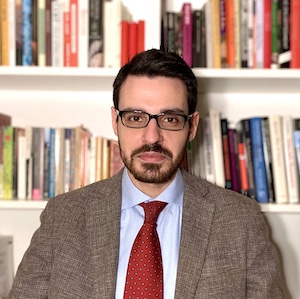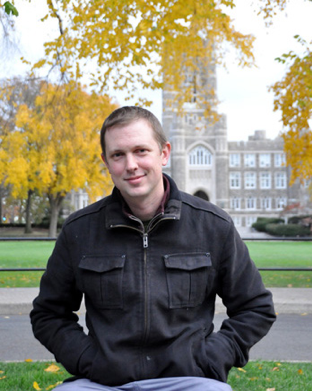The Jewish Book Council awarded Prof. Magda Teter‘s book, Blood Libel: On the Trail of an Antisemitic Myth Libel, the JDC-Herbert Katzki Award. Prof. Teter is the Shvidler Chair in Judaic Studies and Professor of History.
Monthly Archives: January 2021
Prof. Magda Teter’s book, Blood Libel: On the Trail of an Antisemitic Myth Libel, wins National Jewish Book Award.
Comments Off on Prof. Magda Teter’s book, Blood Libel: On the Trail of an Antisemitic Myth Libel, wins National Jewish Book Award.
Filed under Faculty Awards, Faculty Profiles, Faculty Profiles
Ph.D. candidate Glauco Schettini was awarded a Research and Writing Award from the American Catholic Historical Association (ACHA).
PhD candidate Glauco Schettini was awarded a Research and Writing Award from the American Catholic Historical Association (ACHA). The award, which is offered to graduate students and contingent faculty, will fund research and writing time for an article entitled “A Star Is Born: Pius VI and the Invention of Papal Celebrity,” which springs from Glauco’s dissertation, “The Catholic Counterrevolution: A Global Intellectual History, 1780s-1840s.” Drawing on recent scholarship that traces the birth of modern forms of celebrity and charisma back to the Age of Revolution, the article intends to show how popes, starting with Pius VI (1775-99), refashioned themselves as charismatic leaders and used their newfound popularity as a political tool in their fight against reforming sovereigns and revolutionary regimes that advanced a secularizing agenda. This eighteenth-century “reinvention” of the papacy, which paralleled the consolidation of papal power within the Catholic church, represents a crucial chapter in the emergence of charismatic forms of power at large—and perhaps helps explain why people by the millions interact with Pope Francis’s tweets today!

Comments Off on Ph.D. candidate Glauco Schettini was awarded a Research and Writing Award from the American Catholic Historical Association (ACHA).
Filed under Grad Student News, Graduate Student, Student Awards
Prof. Saul Cornell, the Paul and Diane Guenther Chair in American History, published “What today’s Second Amendment activists forget: The right to not bear arms” in The Washington Post.
On January 18, 2021, Prof. Saul Cornell, the Paul and Diane Guenther Chair in American History, published “What today’s Second Amendment activists forget: The right to not bear arms” in The Washington Post.

Comments Off on Prof. Saul Cornell, the Paul and Diane Guenther Chair in American History, published “What today’s Second Amendment activists forget: The right to not bear arms” in The Washington Post.
Filed under Public History, Publications
Dr. Esther Liberman Cuenca, who earned her Ph.D. in medieval history at Fordham in 2019, has been awarded the 2021 Van Courtlandt Elliott Prize from the Medieval Academy of America, which recognizes a first article in the field of medieval studies of outstanding quality.
Dr. Esther Liberman Cuenca, who earned her Ph.D. in medieval history at Fordham in 2019, has been awarded the 2021 Van Courtlandt Elliott Prize from the Medieval Academy of America, which recognizes a first article in the field of medieval studies of outstanding quality. The prize, for her article, “Town clerks and the authorship of custumals in medieval England,” Urban History 46:2 (2019): 180-201, was established by the Medieval Academy of America in 1971 and consists of a certificate and a monetary award of $500. It will be presented at the Academy’s 2021 Annual Meeting, hosted online by Indiana University, Bloomington. She is one of two winners of the award this year. The prize committee submitted the following citation.
In her perceptive and finely-crafted essay Esther Liberman Cuenca examines the expertise and duties of clerks in medieval English towns, and particularly their roles in creating custumals, or collections of written customs. She highlights and traces two fundamental aspects of clerks’ authorship, their legal and administrative expertise, and their roles in transmitting urban laws to posterity. Urban historians of the Middle Ages are familiar with custumals, documents found in almost every medieval towns that regulated the lives of their citizens, from markets and commerce to administration, social mores and hygiene. While historians usually locate and frame analyses of the documents within the history of urban politics and “normalization”, they rarely study who actually drafted them. Cuenca’s innovative article engages the historiography of urban literacy, and of the anonymous professionals who supported literacy within an urban institutional framework. Her careful analysis of their oaths and administrative practices, which often adapted older materials, reveals that town clerks played critical roles in transmitting customary law to future generations of administrators. Clerks were usually left in the shadow of their superior, and the vital contribution of Cuenca’s work is to bring these individuals to light by focusing on the creation, organization, and preservation of urban custumals, and most of all on their authorship. Were these clerks scriptores, compilatores, or commentators? By showing that they fulfilled all of these roles, Cuenca reaffirms their existence in urban memory.

Comments Off on Dr. Esther Liberman Cuenca, who earned her Ph.D. in medieval history at Fordham in 2019, has been awarded the 2021 Van Courtlandt Elliott Prize from the Medieval Academy of America, which recognizes a first article in the field of medieval studies of outstanding quality.
Filed under Alumni Awards, Alumni News
Prof. Kirsten Swinth’s work featured in The New Yorker.
Prof. Jill Lepore’s January 11, 2021, article, “What’s Wrong With the Way We Work,” featured Prof. Kirsten Swinth’s work. Lepore writes, “Plenty of people still feel that way about their jobs. But Terkel’s interviews, conducted in the early seventies, captured the end of an era. Key labor-movement achievements—eight hours a day, often with health care and a pension—unravelled. The idea of the family wage began to collapse, as Kirsten Swinth points out in ‘Feminism’s Forgotten Fight: The Unfinished Struggle for Work and Family’ (Harvard).”

Comments Off on Prof. Kirsten Swinth’s work featured in The New Yorker.
Filed under Faculty News, Faculty Profiles
Prof. Christopher Dietrich publishes “Erasing the Marks of Domination: Economic Sovereignty, Decolonization, and International Lawmaking in the 1950s and 1960s” in Journal of the History of International Law / Revue d’histoire du droit international.
Prof. Christopher Dietrich publishes “Erasing the Marks of Domination: Economic Sovereignty, Decolonization, and International Lawmaking in the 1950s and 1960s” in Journal of the History of International Law / Revue d’histoire du droit international.
Below is the abstract:
This article tells a legal and intellectual history of oil and decolonization in the 1950s and 1960s through the projects of international institutions including the UN Permanent Sovereignty Commission and the Organization of Petroleum Exporting Countries and the work of anti-colonial lawyers Hasan Zakariya and Nicolas Sarkis. It examines the ideas and infrastructure of decolonization as they related to the question of how international law could be used to win economic sovereignty.

Comments Off on Prof. Christopher Dietrich publishes “Erasing the Marks of Domination: Economic Sovereignty, Decolonization, and International Lawmaking in the 1950s and 1960s” in Journal of the History of International Law / Revue d’histoire du droit international.
Filed under Faculty News, Faculty Profiles, Faculty Profiles, Publications
Prof. Asif Siddiqi publishes “Whose India? SITE and the origins of satellite television in India” in History and Technology: An International Journal.
Prof. Asif Siddiqi publishes “Whose India? SITE and the origins of satellite television in India” in History and Technology: An International Journal.
Below is the abstract:
This essay explores the origins of the Satellite Instructional Technology Experiment (SITE), a project that used a NASA satellite to beam educational programs to over two thousand villages in India in the mid-1970s. Touted as a major success in using advanced technology for the purposes of poverty alleviation, the results of the project remain contested. I argue that the causes of its ambiguous outcome can be traced to the late 1960s when Indian and American scientific elites mobilized support for this project by uniting a coalition of diverse actors that each imagined a different ‘India’. Although each of these ‘Indias’ represented a starkly different vision of the nation, they were consonant for a brief historical moment, thus enabling SITE to come to reality. Their ability to do so depended on framing as monolithic and passive, the one population central to the project, the ‘poor and illiterate’ of India.

Comments Off on Prof. Asif Siddiqi publishes “Whose India? SITE and the origins of satellite television in India” in History and Technology: An International Journal.
Filed under Faculty News, Faculty Profiles, Publications
Congratulations! Prof. S. Elizabeth Penry’s Book Receives Susan Socolow-Lyman Johnson Prize from the Conference on Latin American History.
Prof. S. Elizabeth Penry’s The People Are King: The Making of an Indigenous Andean Politics received the Susan Socolow-Lyman Johnson Prize. The People Are King has also been awarded the Flora Tristán Prize.

Comments Off on Congratulations! Prof. S. Elizabeth Penry’s Book Receives Susan Socolow-Lyman Johnson Prize from the Conference on Latin American History.
Filed under Faculty Awards, Faculty News, Faculty Profiles

